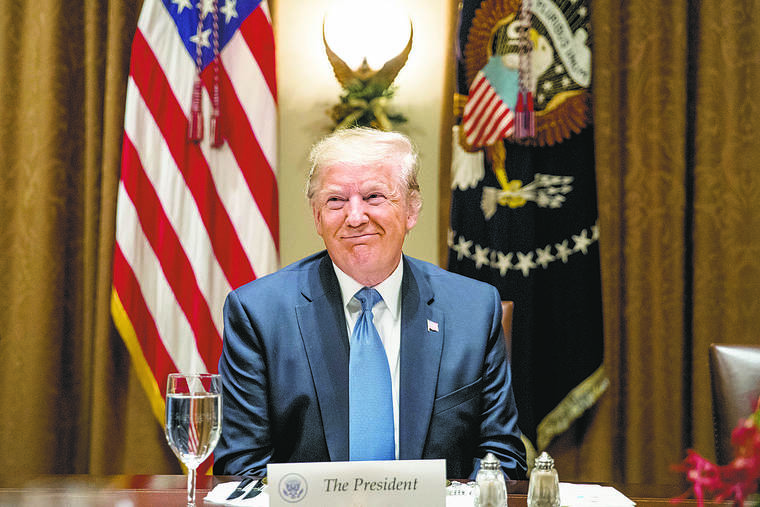In the coming days, the U.S. House of Representatives will take a consequential and, for some of its members, an acutely painful vote on two articles of impeachment, charging President Donald Trump with abuse of power and obstruction of Congress.
It’s been a divisive and exhausting exercise for the members of two House committees, led by the Democratic majority. And it’s almost as much of an upheaval for those who have simply watched the inquiry hearings over the past several weeks, those within the Beltway and across the nation.
This would be only the third time in American history the chamber would vote on impeaching a president. Andrew Johnson was the first, in the wake of the Civil War; Bill Clinton was the second; neither was convicted in the subsequent trial by the U.S. Senate. Richard Nixon’s articles of impeachment were approved by committee, but he resigned before they moved to the House floor.
Although it is right to think carefully before making this leap, a review of the evidence against Trump should confirm: Voting “yes” to impeach will accomplish a crucial course correction not available to Congress any other way.
The two articles are: abuse of power and obstruction of Congress. Approving them will lay down a bright line to separate the proper exercise of presidential power for the common good from the pursuit of power that belongs in the realm of political campaigning.
Politicians are always working to stay on top, it’s true. But at the point where that compromises established diplomatic and policy goals, as well as national security — as Trump’s actions certainly did — that’s where the line was crossed.
To reach this conclusion requires a clear-eyed review of the evidence behind the articles of impeachment. But it helps to start with the realization of what’s at stake: the integrity of American government.
Republican opponents to this campaign argue that the drive toward impeachment began among partisan foes at the start of the Trump presidency — and there were indeed some of those more strident voices within the Democratic caucus. But they were largely on the fringe, falling well short of a majority even after the lengthy probe into Russian interference by special counsel Robert Mueller.
It was a whistleblower’s report of a troubling Ukrainian diplomatic and security issue that changed minds, among even the newly elected, moderate Democrats.
The president had deployed government assets and the privileges of his office as tools to pursue his own political agenda rather than American interests.
Seven freshmen representatives from swing districts — all with national security professional backgrounds — called out Trump’s actions in a published commentary. That’s when the tide of congressional opinion turned, and a vote to pursue an official inquiry soon followed.
In a July 25 phone call, Ukraine’s new President Volodymyr Zelensky said the U.S. military aid was crucial to his country’s defense in its war with Russia. Trump responded: “I would like you to do us a favor, though.”
The favors he sought were investigations of politically sensitive issues, including a probe of former Vice President Joe Biden, who once headed the Obama administration’s policy on Ukraine, and his son, who had a lucrative post on the board of a Ukrainian gas company. By this time, Biden was a front-running candidate for president, a chief political rival.
Emerging testimony then made it clear that this was not an isolated suggestion. It was a rogue campaign to leverage the aid money and the offer of a White House meeting to get Zelensky’s public promise of investigations.
Leading the charge, plainly at Trump’s direction, was not any experienced diplomat but Rudy Giuliani, the former New York mayor who is now the president’s private attorney.
There are some holes in the evidence, largely because Trump has ordered witnesses subpoenaed by the House not to appear. That’s the essence of the “obstruction of Congress” charge: Congress has the constitutional oversight power, and the president is flouting that.
But there was certainly enough corroboration provided by witnesses to the phone call, and to other key conversations, to make the “abuse of power” allegations credible.
The GOP has countered that the $400 million in aid was ultimately released without conditions and that a meeting was held, though not at the White House. But that was only after the scheme was exposed.
Further, what’s corrupt here is that Trump solicited foreign intervention into U.S. domestic politics, regardless of what happened in the end.
The president of the United States has levers of power at his disposal, but they’re to advance national, not personal, interests. President Trump is fully aware of the power but this distinction escapes him.
Impeachment, sadly, seems the only means of ensuring that this untethered, unscrupulous behavior won’t be tolerated — either from this president, or any future occupant of the White House.

